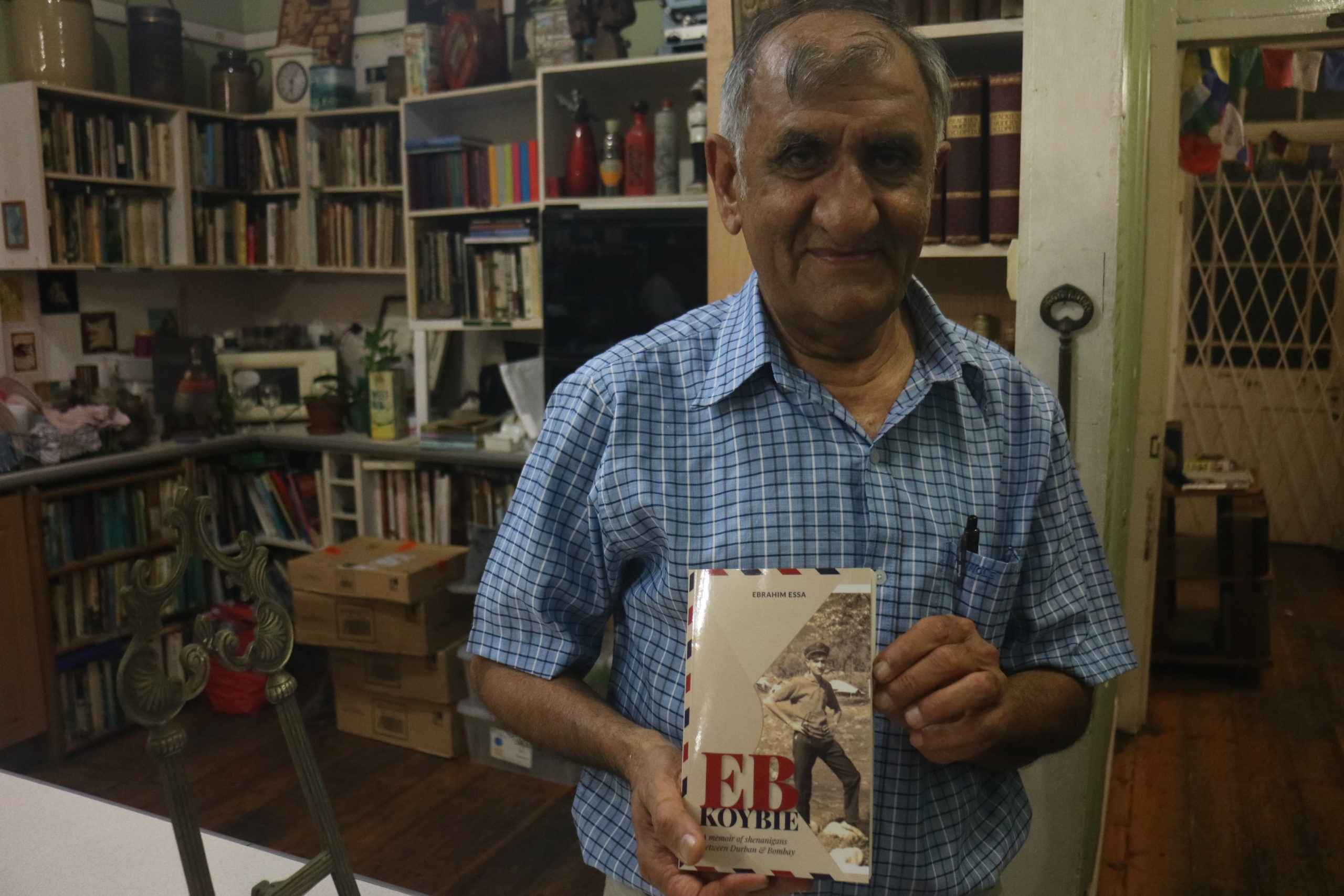
Durban personality Ebrahim Essa launched his book that takes the reader on a rollercoaster ride through a bygone era. Sana Ebrahim reviewed his memoir.
“There are two ways of looking at life – frivolously or sometimes seriously. I had no hope of writing a book. My dad died in India from food poisoning. He wanted somebody to document what happened.
Only when I retired from teaching, did I start writing this book,” said Ebrahim Essa at the launch of book,
‘EB Koybie: A memoir of shenanigans between Durban & Bombay.’
Essa is a Hindi film and comic-book aficionado based in Durban. He taught high school Physical Science for 30 years before retiring in 2016. He is a widely published letter writer to various newspapers across South Africa. Ike’s Books & Collectables in Morningside, Durban was abuzz with literary fans at the launch on recently.
Prof Ashwin Desai opened the proceedings by stating that he considered ‘EB Koybie’ to be an accurate memoir. Panel chairman, Faizal Suleman prompted panelists Ebrahim Essa, Yusuf Patel (Essa’s elder brother aka Walla), Dr Ahmed Essa (Essa’s younger brother), and Dr Ebrahim Patel (Essa’s cousin aka Mini-Ebrahim) with questions about anecdotes from the book. “Some were good memories; some were bitter-sad,” said Dr Patel. The author’s journalist son, Azad Essa edited the book. Azad is senior reporter for Middle East Eye based between Johannesburg and New York City. He was previously based in Doha with Al Jazeera between 2010–2018. Said Azad: “I wanted this book to be something that went beyond his past. In some ways I went in his footsteps – I studied in India for a bit.”
My Review
Eb Koybie, loosely translated from Memon as ‘And for that matter, anybody’ is a phrase coined by Essa, which “became somewhat of an inside joke between him and his father.” The idea is that while this is someone’s memoir, it could be anybody’s story, and again serves as inspiration for people to tell their stories with their characteristic flavour.
In the Foreword, Azad Essa highlights that his dad imparted a sense of civic participation. “If you wanted something done, you’d have to make it happen, or at least die trying.” A childhood account of the great length to which the author went to acquire a packet of comics – collector’s items – Superman and Batman all the way from New York bears testament to this philosophy.
Ebrahim Essa shares the delight of reading: “I was born to read. If nothing else was available, even the telephone directory would do.” I recalled my own experience of Grade 10 English with schoolmaster Ismail Asmal encouraging his learners: “Let reading be your lifestyle!” and “Develop a voracious appetite for reading.” ‘EB Koybie’ has all the elements of a riveting read: daredevil adventure, childhood reminiscences, mystery and mayhem.
Brace yourself for a rollercoaster ride coupled with time-travel backflips through the backstreets of Durban onwards to Bombay aboard the SS Kampala. Meet the witch from Hansel and Gretel, Indian basketwomen, the self-appointed Zorro of Harwin Court, and the threatening cane that add to the thrills.
Storytelling has been Essa’s penchant since childhood. To quote an illuminating extract: “… I was still the uncrowned king of storytelling.
The path to the throne had not been easy and meant stealing Walla’s comics and from his treasury of classics like Treasure Island, Kidnapped and other abridged stories. I was blessed with an uncanny memory to remember only the only important thing in life: fairytales! … To localise the action, I would relate the tale of Goldilocks, but this time around, she stole porridge belonging to the Nagaria family in Wiggins Road, across from the school.
Snow White continued eating apples as red as her cheeks, but would instead be poisoned by that old, wicked Mango-Auntie who often released her two black Alsatian half-breeds on poor, innocent scholars trying to help themselves to the ripe mangoes that had fallen from her trees. Midas, meanwhile, merrily converted base metals not into gold, but into precious lead before selling it to scrapyards like Father’s. Slowly and surely, I would shift the location of these stories to my newly discovered green forest in the city.”
The arresting photographs, such as the one on the book’s cover taken on a visit to Kashmir in 1967, teleports the reader to a bygone era. The chapter subtitles are drawn from movie titles that include ‘Pyaar Kiya To Darna Kya’ and ‘Around the World in 80 Days’, adding a theatrical dimension to the supporting text. Essa reflects in the book: “Many motion pictures I saw, made a lasting impression on me, and caused me to develop a habit of relating some events in the movie directly to reality.”
Essa describes his father’s life as ranking high in adventure. Suliman Essa Patel (1910-1974) “never knew the meaning of defeat or fear, and set himself far horizons with his daring attitude, positive foresight and neverending enthusiasm.”
In an age of gizmos, gadgets and multitudes of competing interests, the magical captivation of a book is still a timeless splendour.


